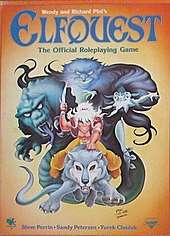Elfquest (role-playing game)
Elfquest is a role-playing game published by Chaosium in 1984, based on the Elfquest series of comics.

Contents
A licensed tabletop Elfquest RPG was produced by Chaosium in 1984, utilizing the Basic Role-Playing system which had first appeared in the game RuneQuest and some original illustrations by Wendy Pini, including the character sheets. Only 3 supplements were produced for the game, ElfQuest Companion – which included random character generation tables, and was included in the paperback second edition.[1] Sea Elves – noteworthy for introducing information and art provided by the Pinis describing the Sea Elf tribe long before they appeared in any of the comics. Elf War – which contained several adventures outside of the comic-book continuity.
Miniatures
Sets of 25 mm white metal miniatures for the game, Journey to Sorrow's End, were released by Ral Partha. They included six standing adults, two children, and a horse and rider.[2] Another set, Personalities, included seven humanoids and the very large serpent Madcoil, was described as follows: "These figures are charming and offer a welcome change from the usual historically-inspired figures. The difference is between sword-and-sorcery and heroic fantasy, between an age of iron and an age of stone and bronze."[2] Similarly Wolfriders I consists of four standing and four riding elves and four wolves in two different poses.
Publication history
Between 1984 and 1987 Chaosium published the Elfquest RPG and several supplements.
- Elfquest (1984 Box)
- The Elfquest Companion (1985)
- The Sea Elves (1985)
- Elfwar (1987)
- Elfquest (1987 Box)
Both the role-playing game and the comics themselves have sprung a number of online games (mostly MUSHes).
Ral Partha released miniature figures for Elfquest, including Wolfriders I, Journey to Sorrow's End, and Personalities.[2]
Elfquest did not sell nearly as well as hoped. Sandy Petersen, who worked at Chaosium at the time Elfquest was developed, blames this on it being given to the same developer as the new edition of Runequest which was being worked on at the same time, which resulted in Elfquest being used as a 'test bed' for complex mechanics that were going to be used in Runequest. Petersen speculates that the resulting game was much more complex than fans of the Elfquest comics were likely prepared for.[3]
Reception
Murray Writtle reviewed Elfquest for White Dwarf #60, giving it an overall rating of 9 out of 10, and stated that "This is really the nicest RPG I have seen to give someone as a present. It would suit especially a new player or the parents of young children, who will undoubtedly love the elves wholeheartedly, but also any player who really cares about The Story."[4]
Reviews
- Fantasy Gamer #6
- The V.I.P. of Gaming Magazine #2
- Different Worlds #46
- Casus Belli #22 (Oct 1984)
References
- review of Elfquest Companion by Steve Perrin on rpg.net
- Barton, William A. (Nov–Dec 1984). "Capsule Reviews". Space Gamer. Steve Jackson Games (71): 59.
- Petersen, Sandy. "discussion thread on rpggeek.com"
- Writtle, Murray (December 1984). "Open Box". White Dwarf. Games Workshop (Issue 60): 12.